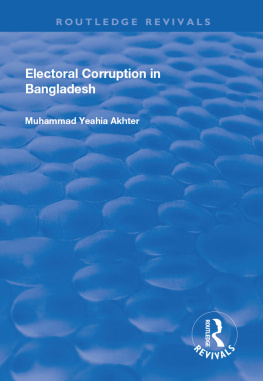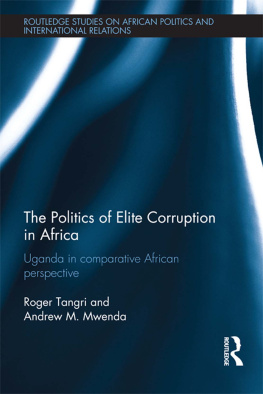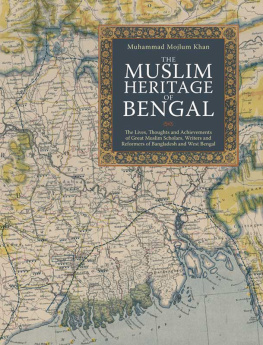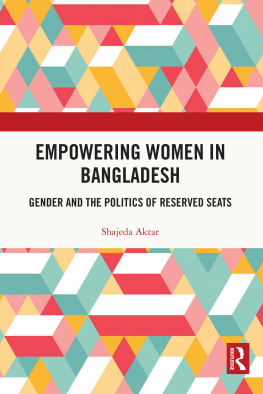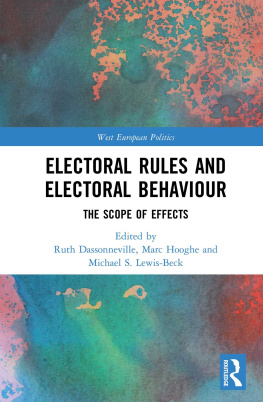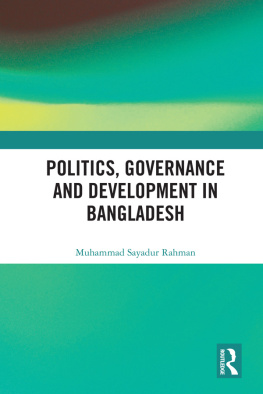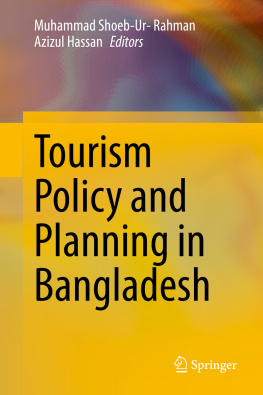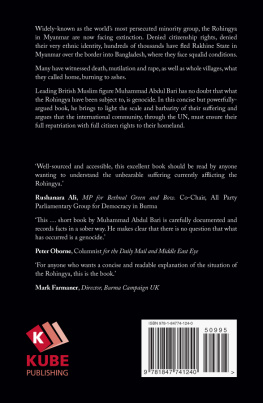First published 2001 by Ashgate Publishing
Reissued 2018 by Routledge
2 Park Square, Milton Park, Abingdon, Oxon OX14 4RN
711 Third Avenue, New York, NY 10017, USA
Routledge is an imprint of the Taylor & Francis Group, an informa business
Copyright Muhammad Yeahia Akhter 2001
All rights reserved. No part of this book may be reprinted or reproduced or utilised in any form or by any electronic, mechanical, or other means, now known or hereafter invented, including photocopying and recording, or in any information storage or retrieval system, without permission in writing from the publishers.
Notice:
Product or corporate names may be trademarks or registered trademarks, and are used only for identification and explanation without intent to infringe.
Publishers Note
The publisher has gone to great lengths to ensure the quality of this reprint but points out that some imperfections in the original copies may be apparent.
Disclaimer
The publisher has made every effort to trace copyright holders and welcomes correspondence from those they have been unable to contact.
A Library of Congress record exists under LC control number: 00111544
ISBN 13: 978-1-138-70684-2 (hbk)
ISBN 13: 978-1-315-20159-7 (ebk)
This book has originated from my Ph.D. dissertation Elections and Electoral Corruption in Bangladesh: Civilian, Military and Non-partisan Regimes in Perspective submitted to the University of Sydney, Australia, in 1999. I am indebted to Dr. G. R. Curnow (University of Sydney) and Dr. Habib Zafarullah (University of New England) for their sincere supervisory assistance. Australian government granted me scholarship and the University of Chittagong sanctioned study leave to enable me to pursue this research. I am grateful to them. Professor Lawrence Ziring (Western Michigan University), Professor Muhammad A. Hakim (University of Chittagong) and Dr. Dennis Wright (University of New England) have read this study and made useful suggestions, which have been incorporated in this work. I am thankful to them. Dr. Ahmed Shafiqul Huque of City University of Hong Kong has encouraged me to publish this study. I would like to record my regards to him.
Professor Nizam Ahmed and Professor Mahfuzul H. Chaudhury of University of Chittagong were further sources of encouragement. During my field research, Sheikh Kamrul Alam made available valuable material for the study and my former students S. M. Morshed and Sanaullah Noori provided election reports and other important documents. My cousin Sheikh Farhad Nur mailed weekly magazines that helped me analyse contemporary Bangladeshi electoral politics. District administration and election office at Magura deserve special mention for their cooperation during my data collection trip. The Commonwealth Secretariat (London), the National Democratic Institute (Washington) and the Fair Election Monitoring Alliance (Dhaka) deserve thanks for sending me their reports on several elections, as does Dr. Aminul Haque of the Coordinating Council for Human Rights in Bangladesh (CCHRB) for providing its reports on a number of elections. I would also like to record my appreciation to the staff at various libraries, namely Fisher Library, University of Sydney; Dana Poter Arts Library, University of Waterloo; Khulna Public Library; Chittagong University Library and Seminar Library of the Department of Political Science, Chittagong University. The assistance of my colleagues at the University of Chittagong is acknowledged while my brother, sisters and other relatives also helped me in various ways. I am grateful to Ashgate Publishing Limited for agreeing to publish this work.
Finally, my special thanks go to my wife Nurjahan Begum and to my two daughters Deeni Fatiha and Karishma Fatiha who patiently tolerated my continuous absence from home during drafting of the study.
Muhammad Yeahia Akhter
Department of Political Science
University of Chittagong
Bangladesh

